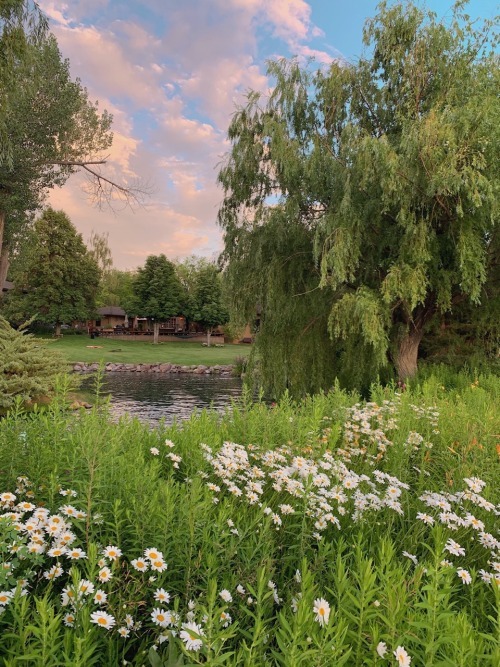How To Sound More Like A French Native Speaker 🌿
how to sound more like a french native speaker 🌿
The following points are 5 classic French conversational techniques and mannerisms to help you sound just a bit more truly français:
1. The tactical use of bah
Fairly difficult to translate, the French bah is used rather regularly and can make your speech pattern sound very authentic.
In answer to an obvious question perhaps:
“Tu aimes bien la pizza?” (Do you like pizza?)
“Bah oui, bien sur!” (Well, yes, of course!)
Or something like the following:
“Tu adores le brocoli?” (Do you love broccoli?)
“Bah non! Je déteste!” (No, I hate it!)
Or as a deep, elongated syllable to fill gaps while you think:
“Qu’est-ce que tu fais le weekend?” (What are you doing on the weekend?)
“Baaaaaahh, en fait je ne sais pas encore.” (Well…actually I don’t know yet)
2. Add quoi to the ends of sentences
This one is also not easy to translate, but it would be the French equivalent of “whatever” or “innit.” So, you might imagine that it shouldn’t be used when talking formally, but it’s used often in casual conversation and can perfectly round off a sentence.
“C’est quoi, ça?” (What is that?)
“Euuh, je ne sais pas exactement mais je pense que c’est une sorte de nourriture, quoi.” (Um, I’m not really sure but I think it’s a type of food or whatever.)
3. Using eh, ah and hein like there’s no tomorrow
Whether it’s to fill space while you think or to provoke a response, these elongated vowels are very useful when speaking French. They can be heard very often in conversation.
For example, in English we add “don’t you?”/ “aren’t you?”/ “isn’t it?” to the end of statements to toss the conversational ball back into the other person’s court. The French will simply say “hein?”
“Il fait beau aujourd’hui hein?” (It’s nice weather today isn’t it?)
Try it with raised eyebrows for added French effect.
4. Sufficient use of voilà here, there and everywhere
The slangy English phrases “so, yeah” or “so, there you go” would probably be best translated into French as “voilà.”
When you can’t think of anything else to say at the end of a sentence, you can’t go wrong with a voilà. Sometimes even two. Voilà voilà.
5. Not forgetting the classic French shrug
In response to a question to which you don’t know the answer, respond the French way with an exaggerated shrug, raised eyebrows and add a “baaah, je sais pas, moi!” for good measure.
More Posts from Theblogofwildfellhall and Others
From Beginner to Intermediate: an intense plan for advancing in language
Introduction
I've studied Spanish at school for 3 years and now I'm at a low B1 level. I can actually understand pretty well while listening or reading but I can't communicate fluently.
This plan will include vocabulary build up, some grammar revision, a lot of listening, reading and writing. And could be used for the most languages, not only Spanish.
Plan
Every day:
Conjugate one verb in present, past and future tenses
Make a list about 10 - 30 words long
Create flashcards with them and start learning them (I use Quizlet for flashcards)
Revise yesterday's set of flashcards
2-3 times a week:
Read an article or a few pages from a book
Write a few sentences about anything in your target language
Listen to one episode of podcast (at least one)
Once a week or every two weeks:
Watch a movie in your target language, preferably animated movie as the language used there is easier. You can watch with subtitles
Grammar exercises
Translate some short text
Once a month:
Write something longer, like an essay or report, on chosen topic
Additionally:
Talk to yourself, to your friends, to your pets
Text with someone
Look at the transcription while listening to the podcast for second time
Repeat what you hear (in podcast or movie)
Check words you don't know from the listening and reading
Read out loud
Listen to music in your target language - you can even learn the text and sing along
Watch YouTube in your target language
Change your phone language to the one you're learning
Think in you target language!!!
***This is very intense plan for self-learners, you don't have to do all of these things in the given time. Adjust it to your own pace. I'll try to stick to this, if I have enough time.***
my favorite, lesser used winter words ❄
algid (adj.) cold; chilly; freezing; frozen benumbed (v.) deprived of physical or emotional feeling (like your fingers when it’s really cold!) blustery (adj.) characterized by strong winds boreal (adj.) arctic; frigid brumal (adj.) characteristic of winter. crystalline (adj.) having the structure and form of a crystal (snowflakes) frore (adj.) frosty; frozen gelid (adj.) chilly; brisk halcyon (adj.) denoting a period of time in the past that was idyllically happy and peaceful. (originally meant to refer to calm winter weather) hiemal (adj.) pertaining to winter; wintry nippy (adj.) cold yeah, it just means cold, but it’s cute

Peleș Castle in Sinaia, Romania.
-
 tis-i-bi-oxirito liked this · 1 month ago
tis-i-bi-oxirito liked this · 1 month ago -
 profiterole-reads liked this · 1 month ago
profiterole-reads liked this · 1 month ago -
 pratiquecompte reblogged this · 1 month ago
pratiquecompte reblogged this · 1 month ago -
 pratiquecompte liked this · 1 month ago
pratiquecompte liked this · 1 month ago -
 daveslutstaine liked this · 1 year ago
daveslutstaine liked this · 1 year ago -
 adventuretolkienlover liked this · 2 years ago
adventuretolkienlover liked this · 2 years ago -
 rhythmofherdrum liked this · 2 years ago
rhythmofherdrum liked this · 2 years ago -
 frenchlearningblog reblogged this · 2 years ago
frenchlearningblog reblogged this · 2 years ago -
 enchantingbearddreamer liked this · 3 years ago
enchantingbearddreamer liked this · 3 years ago -
 sourpatches111 liked this · 3 years ago
sourpatches111 liked this · 3 years ago -
 thirdman000 reblogged this · 3 years ago
thirdman000 reblogged this · 3 years ago -
 altr-fred liked this · 3 years ago
altr-fred liked this · 3 years ago -
 raraivy liked this · 3 years ago
raraivy liked this · 3 years ago -
 polyvinylfilms reblogged this · 3 years ago
polyvinylfilms reblogged this · 3 years ago -
 m-mansy reblogged this · 3 years ago
m-mansy reblogged this · 3 years ago -
 m-mansy liked this · 3 years ago
m-mansy liked this · 3 years ago -
 shivverish liked this · 3 years ago
shivverish liked this · 3 years ago -
 oklotea liked this · 3 years ago
oklotea liked this · 3 years ago -
 glorytoukraine2022 liked this · 3 years ago
glorytoukraine2022 liked this · 3 years ago -
 isaaclouisdv liked this · 3 years ago
isaaclouisdv liked this · 3 years ago -
 starttdayynotes reblogged this · 3 years ago
starttdayynotes reblogged this · 3 years ago -
 starttdayynotes liked this · 3 years ago
starttdayynotes liked this · 3 years ago -
 sprinkles-of-bliss reblogged this · 3 years ago
sprinkles-of-bliss reblogged this · 3 years ago -
 absolution-in-absentia liked this · 3 years ago
absolution-in-absentia liked this · 3 years ago -
 tea-and-croissants liked this · 3 years ago
tea-and-croissants liked this · 3 years ago -
 gundedun liked this · 3 years ago
gundedun liked this · 3 years ago -
 redknightrabbit liked this · 3 years ago
redknightrabbit liked this · 3 years ago -
 pipuhattar liked this · 3 years ago
pipuhattar liked this · 3 years ago -
 helios-eoss liked this · 3 years ago
helios-eoss liked this · 3 years ago -
 theoutcastrogue liked this · 3 years ago
theoutcastrogue liked this · 3 years ago -
 slowlymychaos reblogged this · 3 years ago
slowlymychaos reblogged this · 3 years ago -
 paleflowerbasketballdean liked this · 3 years ago
paleflowerbasketballdean liked this · 3 years ago -
 cover-me-in-violets liked this · 3 years ago
cover-me-in-violets liked this · 3 years ago -
 magnetisticc liked this · 3 years ago
magnetisticc liked this · 3 years ago -
 wi11owcows liked this · 3 years ago
wi11owcows liked this · 3 years ago -
 xiofcrows liked this · 3 years ago
xiofcrows liked this · 3 years ago -
 majestythewraith reblogged this · 3 years ago
majestythewraith reblogged this · 3 years ago -
 kasmusser liked this · 3 years ago
kasmusser liked this · 3 years ago -
 edelweiss-and-mushrooms liked this · 3 years ago
edelweiss-and-mushrooms liked this · 3 years ago -
 hkblock liked this · 3 years ago
hkblock liked this · 3 years ago -
 that-one-kid-who-doesnt liked this · 3 years ago
that-one-kid-who-doesnt liked this · 3 years ago
Emma. 27. A blog for Classic Literature, language learning, flowers, and aesthetic
117 posts













